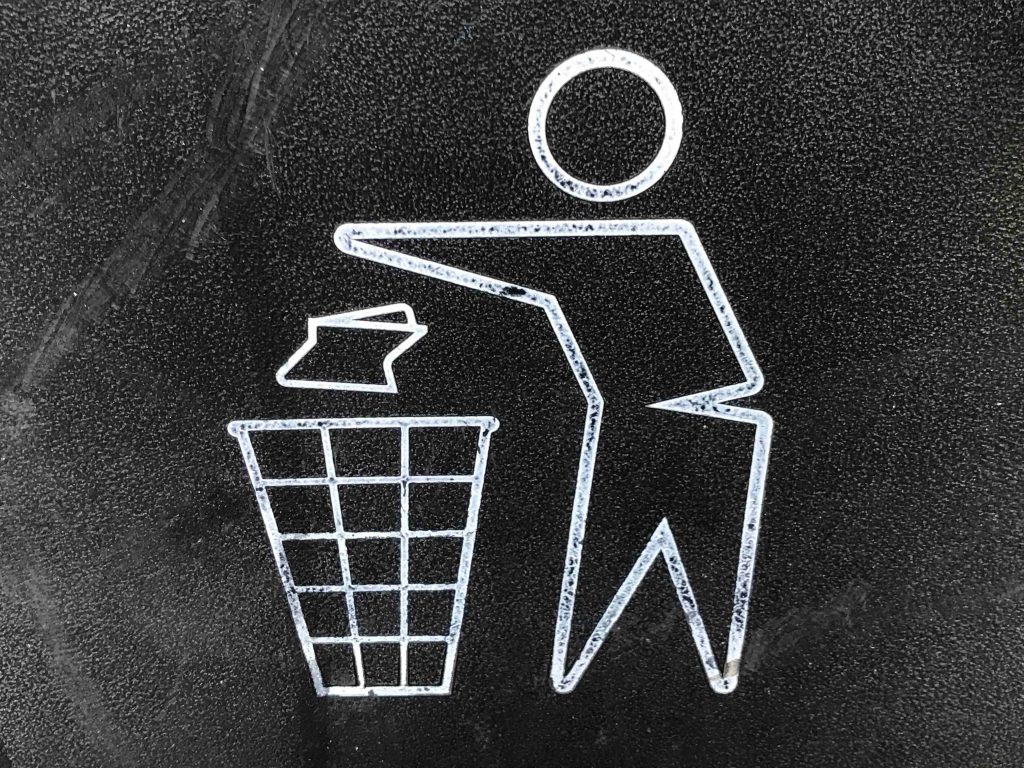
Best Eco-Friendly Trash Bag
Eco-friendly trashbags seem like a simple product. Unfortunately, that is not the case. My hunt for the best eco-friendly trash bag has been my most frustrating hunt for an eco-friendly product. It would make sense if a product was labeled as a biodegradable or compostable trash bag, that if you threw it away that the trash bag would decompose. That is not how it works.

There are four main types of trash bags that are more eco-friendly than normal plastic trash bags: biodegradable bags, compostable bags, plant-based bags, and recyclable bags. Biodegradable and compostable bags sound like they are the same thing, but there are some important differences.
Compostable Trash Bags
Compostable trash bags are regulated and must meet the ASTM Standards D6400 and D6868. The Biodegradable Products Institue is the leading certifying agency of products labeled compostable in the USA.
In order for a plastic to be labeled as commercially “compostable” it must able to be broken down by biological treatment at a commercial or industrial composting facility.
https://www.epa.gov
The EPA also states that a compostable bag must be able to degrade in six months and leave no toxic residues. Trash bags that are labeled compostable are meant to be composted in a commercial composting site that achieves different conditions than a home composting pile. Most trash bags that are labeled compostable, will not decompose in a home composting pile.

Many compostable trash bags are made from plant-based starches. The two most common starches are potato starch and corn starch. Potato starch bags are more eco friendly since potatoes require less water and less land to produce a similar amount of starch as corn.
Biodegradable Trash Bags
Biodegradable trash bags are not as regulated as compostable trash bags. There are not certifying standards approved by the EPA for biodegradable trash bags. They are typically made from plastics that are designed to breakdown over time.
It is deceptive to make an unqualified degradable claim for items entering the solid waste stream if the items do not completely decompose within one year after customary disposal. Unqualified degradable claims for items that are customarily disposed in landfills, incinerators, and recycling facilities are deceptive because these locations do not present conditions in which complete decomposition will occur within one year
https://www.ftc.gov/sites/default/files/attachments/press-releases/ftc-issues-revised-green-guides/greenguides.pdf
The materials that most biodegradable bags are comprised of usually require high heat and oxygen to degrade. These conditions are not met in landfills since there is not enough heat or oxygen in landfills. If you read the fine print of most biodegradable bags, it lists that they degrade in soil, not a landfill.

Biodegradable and Compostable Bag Wrapup
There is not a good way to degrade biodegradable bags, period. There is a very good way to degrade compostable trash bags, commercial compost facilities. Unfortunately, both of these products are not designed to degrade in landfills, where most of our trash goes. These bags are not great products to use for everyday trash which eventually makes it to a landfill.
Recycled Plastic Trash Bags
Recycled plastic trash bags are really easy to explain compared to biodegradable and compostable trash bags. They are simply trash bags where a portion or all of the bags are made from recycled plastic. This reduces the amount of fossil fuels used in the bags. The more items that are made from recycled plastic also increases the demand for recycled plastic and allows our plastics to continued to be recycled.
Plant-Based Trash Bags
Plant-based trash bags are simply trash bags that are not made from petroleum like traditional plastic bags. Some plant-based trash bags are compostable or biodegradable, but not all. Some plant-based trash bags are also recyclable.
I have found that one negative with some plant-based trash bags is that they often are not as durable as traditional plastic bags. Some have weaker seams and do not stretch as much as traditional plastic trash bags. I have had more than a few messy episodes with plant-based trash bags.
Best Eco-Friendly Trash Bags
My first inclination was to go towards biodegradable and compostable bags. I learned during my research are not the best option. Even though it sounds like they will degrade, they will not degrade in normal circumstances. I prefer plant-based and recycled plastic trash bags. These are not the ideal solutions since you still have a trash bag at the end of the day.
Wrap Up
My best eco-friendly trash bag review does not have a great conclusion. Your best option is to reduce the total amount of waste would you produce and need fewer trash bags. I think it is also important to use the trash bag that you would use the fewest of. Some people have a long walk with their trash bags to the trashcan and a stronger recycled plastic bag might be the best option for them. Other people are more gentle on their trash bags and are able to use a thin plant-based bag.
- Best Eco-Friendly Glass Cleaners
- Best Eco-Friendly Wood Cleaners
- 5 Best Eco-Friendly Toilet Bowl Cleaners
- Best Eco-Friendly Dishwasher Detergent
- Best Eco-Friendly Laundry Detergent
- Best Eco-Friendly Stainless Steel Cleaner


